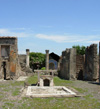
INFORMATION
TIPS FOR TRAVELLERS IN ITALY:
RESTAURANTS: The Italian restaurants are obliges by law to produce a menu, which must be clearly shown on the façade of the entrance. . But on the list of dishes its contents may bear little relation to what is being prepared in the kitchen, particularly in smaller trattorie. Don’t be put off: it only means that the chefs, in their tiny kitchens, are using the best, freshest ingredients available at market that day. |
|
PASTICCERIA: Dolci are a serious business in Italy, and Italians will happily cross from one side of the city to another to obtain the perfect cake., particularly for special occasions. Should You be invited for Sunday lunch, don’t turn up with a bottle of wine but with some finely wrapped cakes.
|
|
BAR: You can have something (a coffee or anything else) standing in the bar. The price will be much higher if You sit down at a café table and have the same thing. |
|
TIPPING: In Italy, tipping is discretionary, and You are quite justified in leaving nothing for service that merited nothing. However, a tip – rarely over 12% - is appreciated everywhere. Most locals leave 10 cents or 20 cents on the counter. Anyway it’s better to tip in cash than by credit card. |
|
TELEPHONE NUMBERS: To call in Italy, You have to use Your country’ exit code (00 in the UK, 011 in the US), followed by the country code for Italy (39). When within Italy, all telephone numbers now require that the area code is dialled as part of the number , whether You are in the relevant area or not. |
|
CHURCHES: Italy is awash with churches and, frequently, it is very interesting to visit them. |
|
TICKETS AND ADMISSION: At state-owned sites, EU citizens under 18 and over 65 are admitted free; some places offer further reductions for groups, full-time students and so on. Keep Your ID with You at all time; You never know when You might qualify for cheaper tickets. Tickets prices at sites not owned by the state – including many smaller museums and galleries – vary, but rarely exceed Euros 5. |
|
ELECTRICITY: Most wiring systems work on 220V. Two-pin adapter plugs can be bought at electrical shops (look for “Casalinghi” or “Elettricità”) or at airports. |
|
|
HEALTH:
Emergency health care is available for all travellers through the Italian national health system and, by law, hospital casualty departments must treat all emergency cases for free. However, to avoid hassle if You’re only visiting for a short time, it’s worth taking out private health insurance. |
|
PHARMACIES: Farmacias, marked by a large red or green cross, will give informal medical advice for simple ailments, and will make up prescriptions from a doctor. Over-the-counter drugs such as aspirin are more expensive in Italy than in the UK or US. |
|
ID: Under Italian law, You are technically required to carry a photo ID at all times. However, in reality You will only be asked to show it on rare occasions, such as when cashing traveller’s cheques or checking into a hotel. |
|
MONEY: Euro coins and notes from any Eurozone country are legal tender in Italy. By law, You must be given a receipt (scontrino fiscale) for any transaction . |
|
ATM: Most banks, even in the smallest towns, have cash machines (Bancomat) that allows You to withdraw money with cards bearing the Eurocard, Maestro, Cirrus or Visa symbols. |
|
BANKS: Most banks are open 8.20am-1.20pm, 2.45-3.45pm Mon-Fri. All are closed on public holidays, and work reduced hours the day before a holiday, usually closing around noon. |

